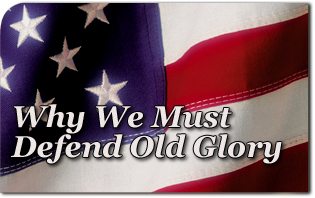Throughout our history, our flag has always played a key role. Our fondness for this national symbol cannot be dismissed as mere sentimental attachment. Rather, the flag somehow calls upon us to look beyond our individual concerns and grasp the reality of the invisible bonds that link us together as a people.
It calls to mind our moral commitment to be concerned with the common good and not only seek after pleasures. We are asked not to be content to reap legitimately the vast benefits of belonging to this great nation. We come to realize that, like a family, we are a nation with a unity forged together by a common history of trials, sacrifices and joys.
Making manifest these very real but unseen ties is what makes our flag so important. For while this unity is materially invisible, the flag renders it visible to our eyes.
Through the flag, we see the visible reality of that moral commitment we all make to the common good when we participate in society. It is the observable expression of those common ties whereby we share in the past and present deeds of others; that common heritage that makes us proud to bear the name of Americans.
Moreover, the flag expresses these same sentiments over the generations. The flag belongs to no political party or social group. It goes beyond our transitory existence and the petty party politics of the day.
Indeed, we will all die and our existence will fade from memory. However, nations and symbols endure through history. Old Glory has flown for over two centuries and as long as it flutters in the wind, it invites all Americans to look beyond themselves and consider the life and destiny of the nation and renew our commitment to the shared ideas, political existence and traditions of our society.
By honoring the flag, we are not saying that the nation is without its faults. Like all things human, we can and do err. We do not advocate deifying the nation, its people or symbols which leads to an irrational nationalism.
At the same time, we cannot advocate an equally irrational individualism whereby those dishonoring the flag claim the right to turn their personal dissent into a supreme standard of action.
Those who would claim the flag is a symbol of the individual’s real or imagined rights do not understand its function. National flags have never been the expression of an unlimited personal freedom. Quite the contrary, they have always been the celebration of the unitas ordinis, that unity of order whereby one commits oneself to the common good.
That is why we rally around the flag in times of trial and suffering. That is why the soldier is buried with the symbol of his selfless allegiance to the whole nation. That is why when Old Glory waves, one feels the exaltation of being part of that social reality called America.
When one degrades or burns the flag in dissent, one negates the very mechanism of unity we need to solve problems through normal and legitimate channels. By proclaiming a personal “right” to burn the flag, one engages in an anarchic gesture that brutally rips the nation’s social fabric. By trampling upon the flag, one tramples upon the nation’s honor and pride together with one’s own individual identity.
Thus, it is natural that citizens of a nation legally protect their flag. They do not wish to see it desecrated and sullied with impunity. Disrespect for the flag is a sure sign of the progressive disintegration of that invisible unitas ordinis which constitutes the nation. It creates the conditions whereby the nation starts to disappear, and its symbols become meaningless relics of bygone times.
On the contrary, the zeal with which the symbols are venerated is the best sign of the vivacity and power of the nation. It proclaims our faith in our unity as a people and fortifies our national resolve. We may disagree with public policy but we must still respect the flag as an act of true and virtuous patriotism.
What is important is not the piece of cloth, but what it stands for: the unitas ordinis of our people, our heritage, the nation’s dignity and our sovereignty. And that is why, in these so uncertain times, our Stars and Stripes should be the object of enthusiasm, affection, respect and endearment on the part of all Americans.



